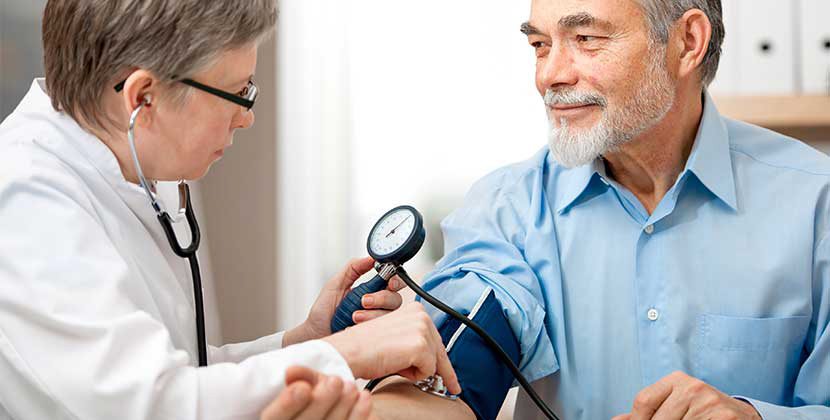High blood pressure, or hypertension, is the most common cardiovascular disease with more than 30 percent of American adults affected by it. Men and women have a similar risk for developing high blood pressure but after the onset of menopause, women are actually at a higher risk.
Blood pressure measures the pressure that the blood exerts in our vessels. The top (systolic) number measures the pressure when the heart beats or contracts and the bottom (diastolic) number measures between beats, when the heart is relaxing. Readings below 120/80 are considered normal for most adults. The normal blood pressure range was initially established based on life insurance tables, which found people were more likely to die when their blood pressure was above 120/80.
Blood pressure is considered high when the flow of blood from your heart to your body is exerting too much force on the artery walls. High blood pressure can damage healthy arteries and lead to a heart attack, heart failure, stroke and kidney failure, as well as vision problems.
High blood pressure is anything higher than 120/80. Stage 1, or prehypertension, is when blood pressure is between 120 – 160 systolic or 80 – 99 diastolic. Often, there are no symptoms in this range, which is why hypertension is called the silent killer. Stage 2, or hypertension, is when blood pressure is 160 systolic or higher or 100 diastolic or higher. If your blood pressure falls in this range, you should seek emergency care immediately.
Prevention
The American Heart Association recommends getting your blood pressure checked once every two years after the age of 20. If you are overweight, you’re two to six times more likely to develop high blood pressure. Follow these healthy lifestyle practices to minimize the chance of high blood pressure:
- Healthy diet:Minimize salt and sugar intake, as they can cause an elevation in blood pressure, and avoid processed foods. North Memorial Health Nutrition Counseling provides one-on-one diet support to help manage blood pressure.
- Routine exercise:Get regular aerobic exercise including yoga and tai chi.
- Limit alcohol:Drink alcohol in moderation.
- Minimize stress: It’s good for you. If you’re a type A personality or get stressed easily, your blood pressure will follow.
- Sound sleep: Get eight hours of good quality sleep every night.
- Limit NSAIDs:Avoid use of non-steroidal anti-inflammatory drugs (NSAIDs) like aspirin, ibuprofen and naproxen, which can increase blood pressure.
- Avoid tobacco:Smoking increases blood pressure, as well as cholesterol.
Signs & Symptoms
Warning signs of hypertension include headaches, vision changes, swelling, chest pain and shortness of breath. But most people don’t feel any symptoms unless their blood pressure is severely elevated.
Treatment
If your blood pressure is higher than 120/80, see your doctor right away to evaluate whether you can manage your blood pressure with lifestyle and dietary changes. Prescription medication is often required to manage readings of 140/90 or higher.
To be evaluated for high blood pressure, visit a North Memorial Health clinic or call 763-581-CARE.


